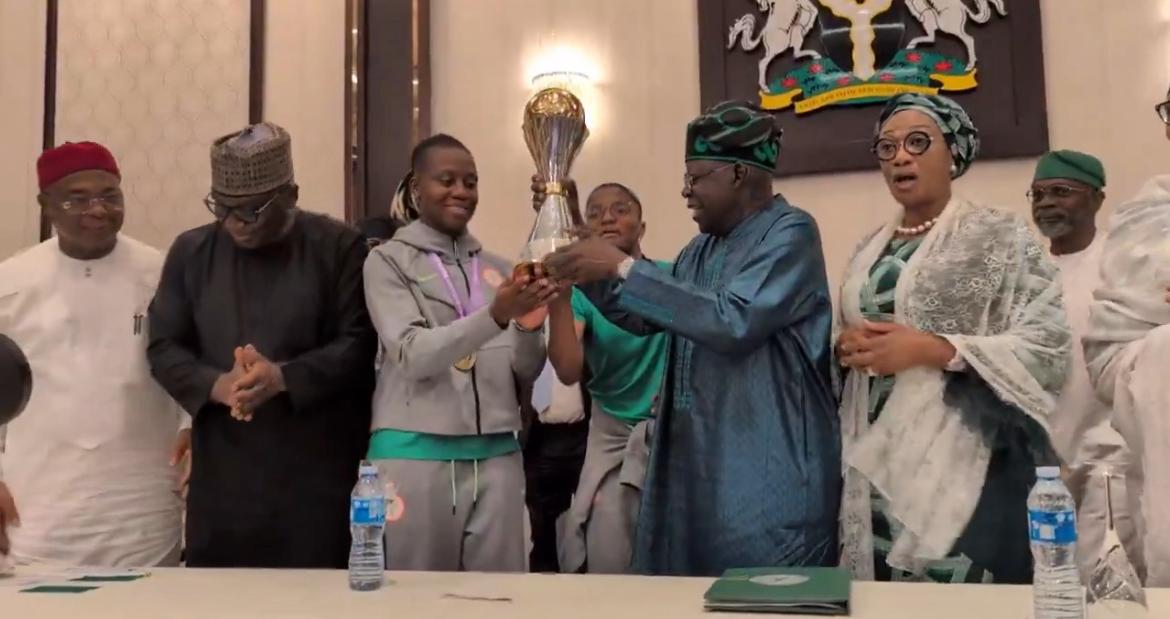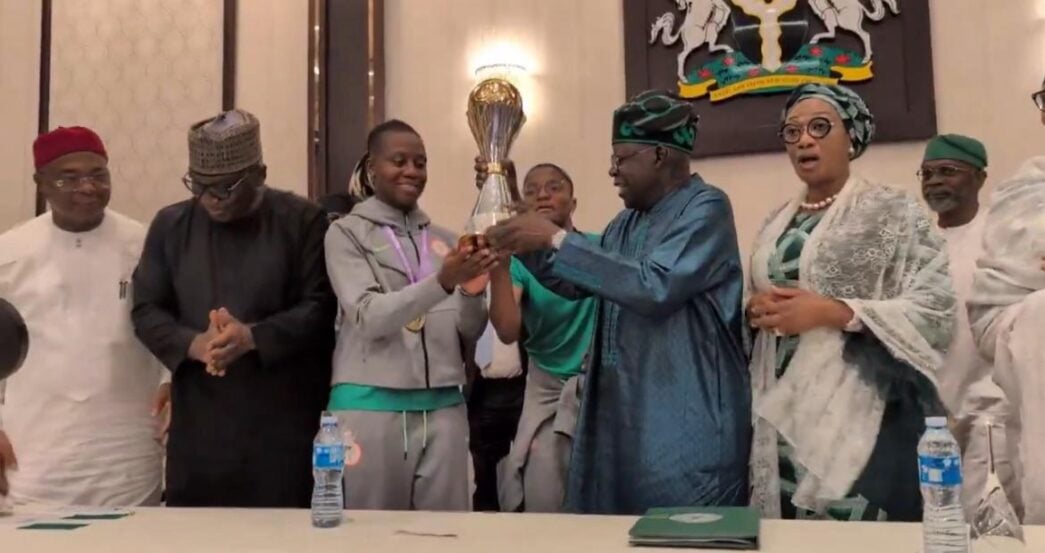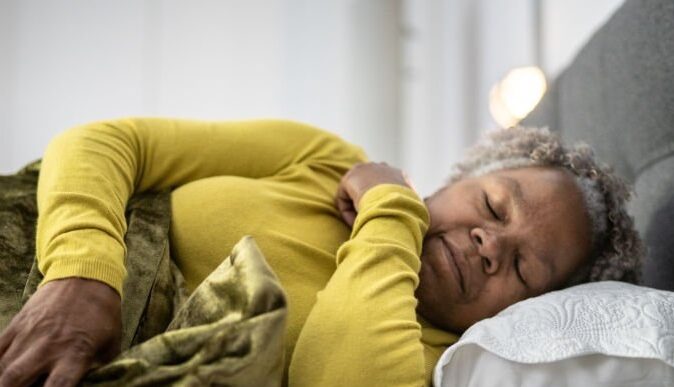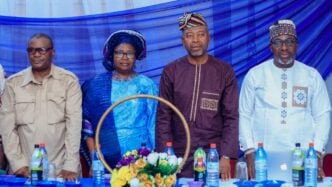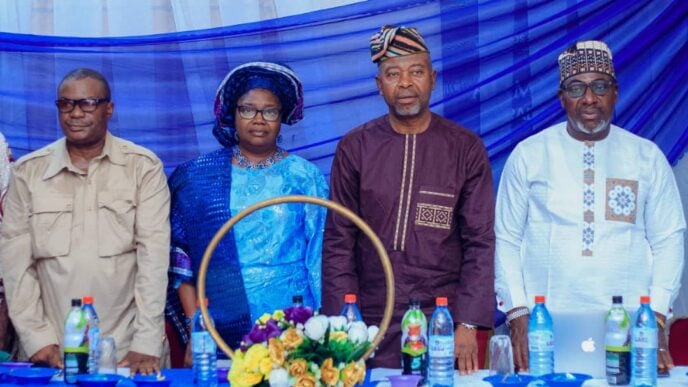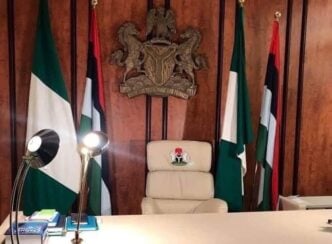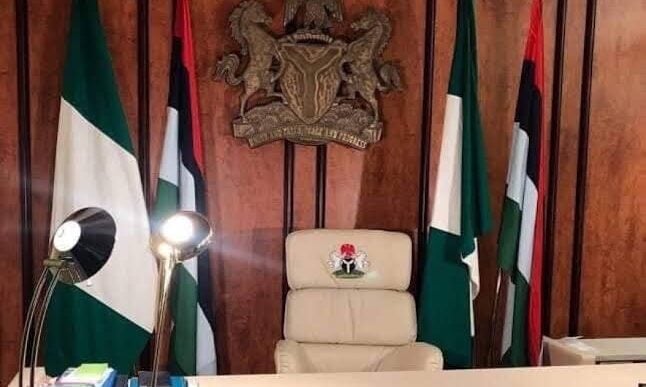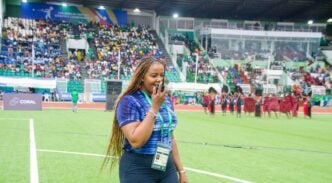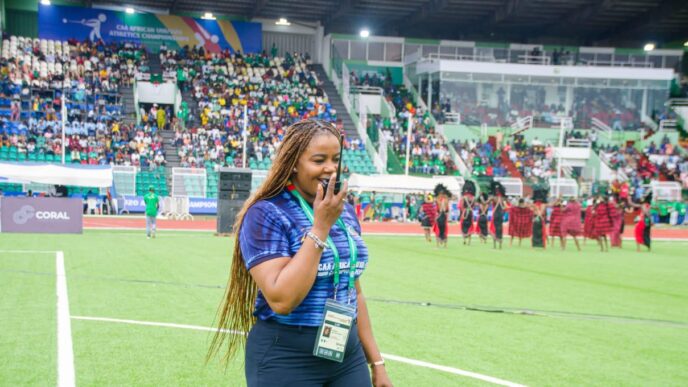Rasheedat Ajibade and Chiamaka Nnadozie present WAFCON trophy to President Bola Tinubu
Nigeria’s Super Falcons have once again etched their names in history, securing a record-extending 10th Women’s Africa Cup of Nations (WAFCON) title, code-named Mission X, in a dramatic 3-2 comeback against Morocco last Saturday but one—on the 26th of July 2025, to be precise. Meanwhile, the D’Tigress, the national women’s basketball team, also secured their seventh Afrobasket title and, in the process, became the first team to win five Afrobaskets in a row last Sunday. In recognition of these achievements, President Bola Ahmed Tinubu awarded each player the prestigious national honour of, “Officer of the Order of the Niger” (OON), a three-bedroom apartment, and a cash reward, an equivalent of $100,000 —approximately ₦153 million. And a three-bedroom flat apartment at the Renewed Hope Housing Estate in the Federal Capital Territory (FCT) for the technical and administrative members of the teams, national honour, and half that amount ($50,000),
Not done yet, fortune continued to smile on the Falcons, as the Nigerian Governors Forum (NGF) chipped in a cash reward of ₦10,000,000 for each of the 24 players. Some of their male counterparts in the Super Eagles (Troodt-Ekong, Alex Iwobi, Ola Aina, Leon Balogun, Joe Aribo, and Ademola Lookman) also gave them a sum of ₦1,000,000 each, in addition to whatever their respective State Governors (Kwara, Imo, Osun, Ondo, Lagos, among others who contributed players to the team) might have given them. MTN Nigeria was never going to sit by and get out-done. The telecom giant also hosted the heroines and splashed the group with a cash gift of ₦150,000,000.
As the Super Falcons harvested their reward for excellence, dedication, and discipline, the D’Tigress too were getting serenade with theirs, following their own historic triumph over the Atlas Lionesses of Morocco. Zenith Bank Plc., the official sponsor of the country’s female basketball league, also hosted the African slamming and donking Queens, donating a sum of ₦200,000,000 to the team in appreciation of the honours they’ve done for the nation.
No sooner were the rewards announced than reactions from Nigerians, from different walks of life, started pouring in. Some said, “the rewards are too much, maintaining that all they did was not even up to a month in the camp”. Another set of commentators said they’re too young to be given that kind of money. Some even tried to compare the reward to what some civil servants get after 35 years of meritorious service to the nation as retirement benefits. Some even (mischievously) compared and contrasted the treatment of the victorious team to the plights of retired police officers and some military personnel who are currently protesting the Federal Government’s failure to pay in full their retirement benefits. Meanwhile, some are of the belief that the amount is well-deserved, or even went to the extreme, saying it is not enough, considering the facts that their (the players’) job is not a pensionable one. So they need to grab as much as fate throws across to them, like this presidential largese.
Advertisement
The argument went further thus: “if they sustain a career-ending, or life-threatening injury, nobody cares. Focus would be shifted to findig a replacement for the injured one”. Whatever line of argument one follows, the fact remains that these are exceptional talents that need to be rewarded exceptionally. So the President is right to have been that generous in his reward system.
That very puerile argument of “the money being too much for a camping period of just about a month”, is what this writer finds very nauseating and reeking of petty jealousy. This is not more than what some of them earn in two weeks at their respective clubs where they ply their trades. Moreover, one doesn’t have to be clever to realise that, the President’s gesture will help to rekindle the interests of parents and kids in sports. It will help jump-start the Sports Economy project of the National Sports Commission (NSC), ably led by Mallam Shehu Dikko, as an integral part of the Renewed Hope Agenda of President Bola Ahmed Tinubu. But that is not the focus of this piece. Reason? I am not Mr. Bayo Onanuga, who is eminently qualified and well-paid to market the President’s policy agenda, and he’s doing a good job of it.
The crux of the matter, which is, my concern, and what inspires this piece is that, a very crucial angle of the conversation is being overlooked, and that is, “how can these athletes manage this largese in a way that ensures the financial windfall secures their future beyond their active years?” Events surrounding the most of our athletes recently, post-retirement, necessitate this thrust of the conversation. Sports is an instrument of socio-economic empowerment, lifting people out of poverty in a magical way—from nothing to something massive; from grass to grace.
Advertisement
The reality of most of Nigerian athletes’ financial struggles, post-retirement, witnessed in recent years, is a lesson from which we, all, must learn and be guided going forward. History is littered with cautionary tales of athletes who earned millions during their careers, only to face financial ruin post-retirement. Some Nigerian footballers, for instance, have famously splurged on luxury assets like private jets, luxury cars, and wrist watches, among other ostentatious lifestyles in the past, only to later depend on government aid and patronage or public fund-raising to cater for things as basic as medical bills.
Some, due to a lack of formal financial advice from experts, got swindled of their hard-earned money by conmen—something that would later plunge them into depression and ultimately lead to their early graves. Others were undone by some smart partners (of the opposite gender). Some have, as a result, become “nuisance” in their neighbourhood, or at any sporting meet where they come across other athletes who are still active professionally. They, sometimes, embarrass athletes, who are more prudent contemporaries of theirs, living more comfortably than they do. I wouldn’t want to embarrass anybody by naming names because, whatever becomes of them today, after retirement, they remain our national heroes and treasures. The current and future Super Falcons and the D’Tigress (and athletes in other sports) must be guided to avoid this fate, by making “smart and sustainable financial decisions”, now for the sake of their future, when their limbs would no longer be up to the task.
Avoiding such involves strategic financial planning for the athletes, which involves:
1. Seek financial guidance from professionals:
The authority should, on their behalf, engage certified financial advisors, in this case, the Nigeria Football Federation (NFF) and the Nigerian Basketball Federation (NBBF). The NFF and the NBBF should facilitate sessions with financial investment experts who specialise in “athletes’ wealth management”, for them. These experts can teach them how to structure investments, do tax planning, and develop long-term savings strategies that guarantee their annuities. Fortunately, we have entities like GTI Asset Management & Trust Limited and Zenith Bank Plc as partners to the NFF and the NBBF, respectively, to provide this guidance. These athletes must be taught to avoid impulse spending. Financial literacy workshops should be made mandatory for the teams, emphasizing “budgeting and risk management.”.
Advertisement
2. Diversify Investments for Sustainable Income.
– Real Estate: the government’s housing gift is a great start, but players should consider additional property investments for rental income.
– Stocks & bonds: Low-risk investments in blue-chip companies and government bonds can provide steady returns.
– Business Ventures: Instead of flashy spending on jewelry, cars, and clothing, players can invest in scalable businesses (e.g., sports academies, agro-processing, or tech startups) that generate passive income.
3. Establish trust funds and retirement savings accounts. Pension Schemes: Enrolling in contributory pension plans ensures financial security post-retirement.
– Education Funds: For their children, and for those, among them, pursuing further studies or transitioning into coaching, setting aside funds for certifications is a wise choice.
4. Learn from retired players. Mentorship Programs: Ex-players like Perpetua Nkwocha, Mercy Akide, Jay Jay Okocha, Kanu Nwankwo, Dr. Segun Odegbami, Barrister Adokiye Amiesimaka, Falilat Osheku-Ogunkoya, Sunday Oliseh, Segun Toriola, Funke Oshonaike, Chioma Ajunwa et al., who have successfully transitioned into coaching, sports administration, or business, should mentor the current squad on financial discipline for the purpose of having financial security for the future.
Advertisement
– Sports federations’ roles: The federation must institutionalize a post-career support system, including financial counseling, entrepreneurship training, and career counseling. Establishing a trust fund for legends could also be a good idea. Such a trust fund could be handled by men and women of impeccable characters like Odegbami, Falilat Oginkoya-Osheku, Adokiye Amiesimaka, Garuba Lawal, Kanu Nwankwo, and Tijani Babangida, among others, to cater for any legend in need of assistance in his or her old age.
Career counseling can also come as a part of the package, where they will be taught their “exit strategy”, from a profession that thrives majorly on self-application and an ultra-high level of physical fitness, which may no longer be there as they age. The strategies could be how they will transition into coaching, management, or administration, which requires less physical stress than playing actively.
Advertisement
5. Avoid an immodest lifestyle.
Delayed Gratification: Whenever there is an increase in earnings, there is a tendency for there to be additional layers of responsibility. Some are self-imposed at times, just to look the part. While others are socioculturally imposed. Remember, this is Africa, where the only social insurance you have sometimes is support from friends and family. It’s tempting to buy luxury cars or designer items, but athletes should prioritize “assets that appreciate in value”, with time.
Advertisement
– Emergency Funds: At least 20% of their reward should be kept in high-yield savings accounts for unforeseen expenses.
Who Should Be Involved in Guiding Them?
Advertisement
– The NFF & the NBBF (in these cases) and the Federal Government: these entities should partner with banks and finance and investment firms to provide structured financial programs.
– Ex-Players: Their lived experiences can offer practical advice on avoiding financial pitfalls.
– Private Sector: Corporate sponsors and NFF’s partners, like
GTI Asset Management & Trust Limited, Zenith Bank Plc., Nike, or Adidas, could offer financial literacy programs as part of their corporate social responsibility, tucked into the partnership deals.
So, beyond the 10th WAFCON title, 7th overall, and 5th consecutive FIBA AfroBasket titles, building a legacy of financial security for the future is of paramount importance.
The Super Falcons and D’Tigress’ ’ victories are more than just sporting triumphs. They are opportunities to redefine financial independence for Nigerian athletes, especially with this unprecedented presidential largese. By making “informed, disciplined choices today,” they can ensure that their respective $100,000 rewards become foundations for lifelong prosperity, rather than a fleeting windfall. Christmas comes, but once a year. This is a lifetime opportunity that may not present itself again before their career winds up.
As a nation, we must shift the conversation from “whether they deserve it or not”, to “how can we help them secure it?” We need to jettison conversations that reek of petty jealousies. The Falcons and the D’Tigress have made Nigeria proud on the pitch; now, let’s ensure they thrive off it, to avoid stories that touch, so that somebody like Dr. Segun Odegbami could be relieved of having to rally round for supports to settle medical bills for ailing retired athletes
; so that a Christian Chukwu will not have to always rely on the large-heartedness of a Femi Otedola to underwrite the cost of treatment overseas; so that a Tijani Babangida will not have to rely on Dutch Eredivisie clubs for crowd-funding to raise €170,000 to treat a wife who survived a ghastly motor accident in Nigeria. To avoid them being crowdfunded before they can offset medical bills for common ailments, like typhoid and malaria. Mind you, no disrespect is meant for those national heroes whose names were mentioned above.
On a final note: the last time I checked, the Super Falcons, and the D’Tigress are still the defending champions of “The Women African Cup of Nations” (WAFCON) and the FIBA AfroBasket, respectively. So, my congratulatory messages to these remarkable national teams are never late, until the following editions of the events are staged and concluded and winners emerge. Congratulations to the Superb Super Falcons and The D’Tigress of Nigeria on their winning record-extending titles…!
Abubakar writes from Ilorin, Kwara state. He can be reached via 08051388285 or [email protected].
Views expressed by contributors are strictly personal and not of TheCable.

